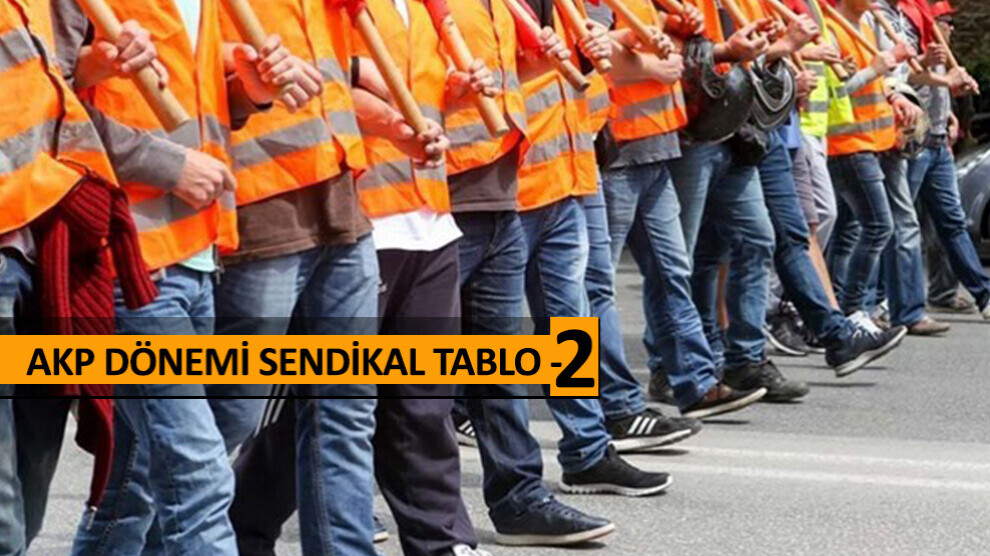"The right to organise is being taken away"
Trade union organising in Turkey and Northern Kurdistan is becoming increasingly difficult. Through legal tricks and loopholes, the capitalists manage to nip any trade union formation in the bud.
Trade union organising in Turkey and Northern Kurdistan is becoming increasingly difficult. Through legal tricks and loopholes, the capitalists manage to nip any trade union formation in the bud.

The AKP/MHP government not only stands for an Islamist social discourse, nationalist racism and war policy, but at the same time for an extremely neoliberal economic model. In order to implement this neoliberal policy, genuine trade union policy is systematically restricted, covered with repression and prevented. Apart from the formation of so-called "yellow unions", i.e. unions that pursue the interests of the state and capital, the legal restriction of workers' self-organisation plays an important role. In particular, the 2012 Law 6356 on Trade Unions and Collective Agreements plays an important role. Here the capitalists are given the right to object to union organising. This prevents the formation of active opposition unions in the private sector.
Irfan Kaygısız, an expert on organising for the union Birleşik Metal-Iş, which is organised in the trade union federation DISK, described the consequences of the legal restrictions on trade union work in an interview with ANF.

"The biggest obstacle is the threat of dismissal"
What are the main obstacles to union organising in Turkey?
There are two main issues: the legal level and its implementation. Both levels have their consequences. As for the practical level, this is also characterised by arbitrariness and disregard for the law, as in all other areas. Some procedures introduced by the legislator are used as arbitrary means. The state looks the other way. But the biggest obstacle to union organising is unemployment, or more precisely, the threat of dismissal. Any attempt to organise is met with a frontal attack by the bosses. Any worker who tries to organise faces the fear of dismissal. Consequently, workers frankly stay away from organising to the point where they are completely at the end of their tether.
The violent use of the means of dismissal naturally has a deterrent effect. In addition, the legal protection of workers is very weak. Although the law provides some protection for workers' representatives, there is no protection at all for workers who try to organise. Moreover, the capitalists divide the workers into separate branches to prevent organising. Within the same factory, some workers are divided into the office sector, some into the metal sector and some into various other sectors. This is done to prevent a majority of one union from forming.
High hurdles to forming unions
Is there no control within the legal framework?
No, there is no such thing. Because in order to organise in any industry, you have to reach the 1 per cent threshold. One per cent seems like a small number, but it is calculated based on the number of workers in each industry. For example, the metal industry employs about 1,800,000 people. 1 per cent of this corresponds to about 35,000 workers. In this respect, it is not so easy to achieve. If we look at the question of independent trade unions, for example, it becomes even more difficult. Of course, a new and independent union can be formed based on criticism of the existing unions, but it is not so easy to reach this threshold. Because that is a very big number.
For example, there was an uprising of metalworkers in 2015. Renault workers had said they wanted to form an independent union. Even if they organise, say, 10,000 workers there, they cannot reach the threshold number of about 30,000. Even if the largest factory organises, the industry share threshold prevents them from forming a union. This means that new, independent and dynamic unions are prevented.
Of course, beyond this, the most fundamental problem is the issue of workplace registration. In terms of registration, there is a threshold that concerns the workplace and one that concerns the company. The workplace is a physical space. The company consists of at least one boss and several locations. Collective bargaining at the workplace level requires at least 50+1 per cent of the members, and 40+1 per cent for the company as a whole. If you want to organise and you have these numbers together, you go to the ministry. Then an evaluation mechanism by the ministry begins, which determines that you have exceeded the 50+1 threshold. That is what we call the determination of approval.
"Legal tricks of the capitalists prevent the formation of trade unions"
What happens then?
The real problem starts after that. After the determination is received, it is sent to two places. It is sent to the unions that employ more than 1 per cent of the workers in the same industry and to the boss. The boss appeals the determination. In recent years, it has become common for capitalists to appeal to courts that do not have jurisdiction. There was no such thing in the past, it seems to be a new scam. For example, the head office of the company is in Izmir, Kocaeli or Gebze, but the boss files a lawsuit in Istanbul. Therefore, the file first then has to get from Istanbul to the competent court. That takes one to one and a half years. In other words, as soon as the boss files a lawsuit in a place that does not have jurisdiction, he gains a year. Any loss of time after organising immediately has a negative effect on the workers.
So, the boss has the right to file such a complaint?
The law provides for the court to decide quickly within three to six days of the company's objection. However, this is not the case in practice. There is already an abuse of this objection mechanism in itself. Firstly, objection before unauthorised courts. Secondly, this "objection" is not a right that capitalists have. Rather, it is an article included in the law as a precaution against any negative situation. Of course, the capitalists do not have the natural right to object to the unionisation of workers. But this mechanism is handled as if the objection itself is a right. Therefore, the appeal leads to two things: long court cases, and during this process the boss mainly puts pressure on the workers. This is about firing workers' representatives and those who push for organising, and pressuring the rest to quit themselves. Through the court case, the capitalists gain two years to break the organising of the workers.
Of course, there is also solidarity among the bosses. Birleşik-Metal-İş, for example, was the only union in Konya. There was one organised factory. All the bosses of the industry joined together and said to the boss of one company, "We will take you to any place you want and all the expenses will be paid by us. As long as there are no unionised jobs here." This is the solidarity of the boss. This happens quite openly in small institutions. When you look at the sum of all these factors, it is clear that this is an attack on organising.
Of course, distrust of the existing unions can also be counted among these factors, can't it?
Yes, unfortunately, the fact that the trade unions are controlled by the state and capital increases the distrust of the trade unions. In fact, in January and February this year, there were strikes in about 30-40 workplaces, all in unorganised workplaces. It is understandable that they were unorganised. But no organisation formed out of them either. In some places, for example in Istanbul, Deri-Iş tried to intervene, for example in hosiery production. In Izmir, Aliağa Liman-İş tried to become active. In Antep, the friends at BİRTEK-SEN union tried to get involved with the textile workers, but could not achieve the desired success. Of course, this is not due to a lack of trust in the friends in Antep, but to a much older problem.
So if we look at our organising, we see that it is more intense in the public sector. The private sector is also developing, of course, but if we look at the total number, the majority of jobs with collective agreements in the public sector is about 9.5 per cent, while in the private sector this number is about 5.5 per cent.
"Absolute ban on dismissal during approval procedure necessary"
What then would be the alternative to this authorisation procedure?
On the issue of licensing, of course, a decision is needed, but that decision should be made through a more independent mechanism. It should be beyond the control of the state. The question of membership is the same. We declare all memberships to the state. But then we find that the official there gives the membership information to the chief.
The appeal mechanism should also be more independent. If an objection is raised to a change in the branch, the question of approval is to be decided by the court. However, the court should not be used as a reason for refusing to organise. Moreover, courts without jurisdiction prolong the process. In other words, the right to organise is taken away from the outset. We do not know what the court will decide after two years. Even if the court rules in favour of the union, there will be no more members in that time. This is a very serious, bleeding wound. If there is no intervention, we will, of course, continue to be threatened with dismissals. Workers would have to be protected by an absolute ban on dismissals during the approval process for the collective agreement. Even such a ban would not completely remove the deterrent. It will not solve the problem, but it will bring some relief.